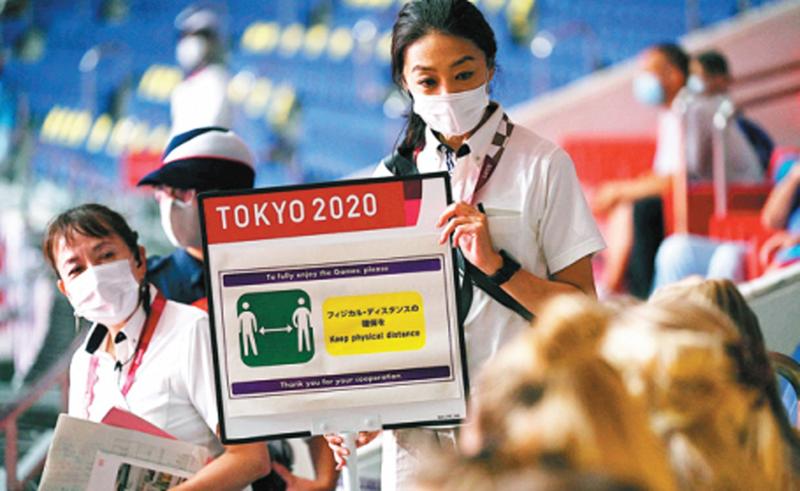 An International Olympic Committee volunteer shows a sign depicting COVID-19 countermeasures to athletes during a men’s handball match between Sweden and Portugal at Yoyogi National Stadium in Tokyo on Aug 4. (PHOTO / AFP)
An International Olympic Committee volunteer shows a sign depicting COVID-19 countermeasures to athletes during a men’s handball match between Sweden and Portugal at Yoyogi National Stadium in Tokyo on Aug 4. (PHOTO / AFP)
As the global COVID-19 tally exceeds 200 million, senior diplomats from the ASEAN Plus Three countries have agreed to accelerate the construction of an emergency medical supplies reserve center and an ASEAN reserve warehouse, and have vowed to work together to fight the pandemic in East Asia.
The pledge was made on Aug 3 at a videoconference of foreign ministers from China, Japan, the Republic of Korea and the members of the Association of Southeast Asian Nations.
They also agreed to enhance cooperation on vaccine research and development, and uphold multilateralism and free trade, as the meeting was held amid the resurgence of COVID-19 infections around the globe and the uneven economic recovery.
State Councilor and Foreign Minister Wang Yi told the meeting that China supports using the 10+3 Cooperation Fund and the ASEAN Anti-Epidemic Fund to obtain vaccines and other urgently needed anti-pandemic materials.
Wang said the 10+3 countries should carry out pragmatic cooperation, promote overall economic recovery and continue to improve the crisis response capacities of East Asian nations.
According to Wang, China has already delivered over 750 million doses of COVID-19 vaccines overseas. It will provide an additional 110 million doses for COVAX — an international initiative aimed at ensuring equitable global access to COVID-19 vaccines — in the next four months and provide another US$3 billion as international assistance over the next three years.
Noting that the origin-tracing of the virus is a scientific issue, Wang said that he hopes all parties will oppose attempts to politicize the issue in order to jointly safeguard global public health.
Next year marks the 25th anniversary of the launch of the 10+3 cooperation mechanism, and Wang urged the countries taking part in the meeting to utilize the opportunity to formulate a 2023-27 work plan to better serve the goals of the East Asian Community.
Wang said the countries should speed up regional economic integration and strive for an early entry into force of the Regional Comprehensive Economic Partnership, in order to improve the risk resistance capacity of industry and supply chains and promote connectivity among the 10+3 countries.
Joint efforts should also be made to step up the digital transformation of the region, make good use of the advantages of East Asian markets and carry out practical cooperation in artificial intelligence and the digital economy, Wang said.
China is willing to cooperate with regional countries on energy security and promoting green growth, he said, adding that it will also continue to share its poverty alleviation experience with all parties to help countries in the region ensure better development.
He also urged East Asia to contribute to global stability, economic recovery and orderly global governance.
The foreign ministers of Japan, the ROK and the ASEAN members also said that the 10+3 countries should adhere to solidarity, openness and inclusion, strengthen partnership, deepen connectivity, and work together for regional development and prosperity.
The Delta variant is bringing spikes of new infections across the region. In Japan, Tokyo Olympics organizers on Aug 4 reported 29 new Games-related COVID-19 cases, including four athletes. Three of the four infected athletes are in the Greek artistic swimming team, the organizers said, without providing further details.
The daily tally of new coronavirus infections in Tokyo hit a record high of 4,166 cases on Aug 4. The trend indicates that the rapid spread of the virus shows no sign of slowing down, said a report by NHK.
Across Japan, 14,207 new coronavirus cases were reported on Aug 4, the highest daily count for the country, bringing the total close to the 1 million mark. More than 15,200 Japanese have lost lives to the virus to date. Tokyo and five prefectures are under the state of emergency.
South Korea also posted a sharp increase in coronavirus cases on Aug 4 as it struggles to tame a fourth wave of infections amid the spread of new virus variants.
The Korea Disease Control and Prevention Agency reported 1,725 cases for Aug 3, up by more than 500 from a day before, as more tests were conducted after the weekend. Total infections rose to 203,926, with 2,106 deaths.
Senior health official Lee Gi-il told a news conference, “There is fatigue from long periods of distancing, and it’s a summer vacation season.”
By early Aug 4, the World Health Organization had reported 199.47 million confirmed cases of COVID-19, including 4.24 million deaths. But according to the Johns Hopkins Coronavirus Resource Center, the number of COVID-19 infections worldwide topped 200 million by late Aug 4.
Xinhua contributed to this report.


